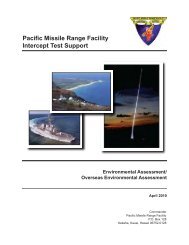NMFS Biological Opinion on U.S. Navy training ... - Govsupport.us
NMFS Biological Opinion on U.S. Navy training ... - Govsupport.us
NMFS Biological Opinion on U.S. Navy training ... - Govsupport.us
Create successful ePaper yourself
Turn your PDF publications into a flip-book with our unique Google optimized e-Paper software.
FINAL PROGRAMMATIC BIOLOGICAL OPINION ON U.S. NAVY ACTIVITIES IN THE HAWAII RANGE COMPLEX 2008-2013<br />
example, the 2008 RIMPAC, 2007 Valiant Shield Exercise, and several Undersea Warfare Exercises) and the surveys<br />
specifically looked for marine mammal behavioral reacti<strong>on</strong>s before and after those <strong>training</strong> events.<br />
To supplement that body of knowledge, we c<strong>on</strong>ducted electr<strong>on</strong>ic literature searches <strong>us</strong>ing the Library of C<strong>on</strong>gress’<br />
First Search and Dissertati<strong>on</strong> Abstracts databases, SCOPUS, Web of Science, and Cambridge Abstract’s Aquatic<br />
Sciences and Fisheries Abstracts (ASFA) database services. The First Search databases provide access to general<br />
biological literature, master’s theses, and doctoral dissertati<strong>on</strong>s back to 1980; ASFA provides access to journal<br />
articles, magazine articles, and c<strong>on</strong>ference proceedings back to 1964. Our searches specifically foc<strong>us</strong> <strong>on</strong> the<br />
ArticleFirst, BasicBiosis, Dissertati<strong>on</strong> Abstracts, Proceedings and ECO databases, which index the major journals<br />
dealing with issues of ecological risk (for example, the journals Envir<strong>on</strong>mental Toxicology and Chemistry, Human<br />
and Ecological Risk Assessment), marine mammals (Journal of Mammalogy, Canadian Journal of Zoology, Journal<br />
of Zoology, Marine Mammal Science), sea turtles (Copeia, Herpetologia, Journal of Herpetology), ecology (Ambio,<br />
Bioscience, Journal of Animal Ecology, Journal of Applied Ecology, Journal of the Marine <str<strong>on</strong>g>Biological</str<strong>on</strong>g> Associati<strong>on</strong> of<br />
the UK, Marine Polluti<strong>on</strong> Bulletin, Oikos), bioaco<strong>us</strong>tics (Bioaco<strong>us</strong>tics, Journal of the Aco<strong>us</strong>tical Society of<br />
America), and animal behavior (Advances in the Study of Behavior, Animal Behavior, Behavior, Behavioral Ecology<br />
and Sociobiology, Ethology). We manually searched issues of the Journal of Cetacean Research and Management<br />
and Reports of the Internati<strong>on</strong>al Whaling Commissi<strong>on</strong>.<br />
Our prior experience dem<strong>on</strong>strated that electr<strong>on</strong>ic searches produce the lowest number of false positive results<br />
(references produced by a search that are not relevant) and false negative results (references not produced by a<br />
search that are relevant) if we <strong>us</strong>e paired combinati<strong>on</strong>s of the keywords: s<strong>on</strong>ar, mid-frequency s<strong>on</strong>ar, aco<strong>us</strong>tic,<br />
marine aco<strong>us</strong>tic, military exercises, sound, and noise paired with the keywords cetacean, dolphin, marine mammal,<br />
pinniped, porpoise, sea turtle, seal, and whale. To expand these searches, we modified these keyword pairs with the<br />
keywords effect, impact, mortality event, resp<strong>on</strong>se, behavior (including the spelling “behaviour” as well as<br />
“behavior”), stranding, un<strong>us</strong>ual mortality event. To collect data for our exposure analyses, we <strong>us</strong>ed the keyword:<br />
encounter rate paired with marine mammal, cetacean, and whale.<br />
We supplemented the results of these electr<strong>on</strong>ic searches by acquiring all of the references we had gathered that,<br />
based <strong>on</strong> a reading of their titles or abstracts, appeared to comply with the keywords presented in the preceding<br />
paragraph. If a reference’s title did not allow <strong>us</strong> to eliminate it as irrelevant to this inquiry, we acquired it. We<br />
c<strong>on</strong>tinued this process until we gathered all (100 percent) of the relevant references cited by the introducti<strong>on</strong> and<br />
disc<strong>us</strong>si<strong>on</strong> secti<strong>on</strong>s of the relevant papers, articles, books, and, reports and all of the references cited in the materials<br />
and methods, and results secti<strong>on</strong>s of those documents. We did not c<strong>on</strong>duct hand searches of published journals for<br />
this c<strong>on</strong>sultati<strong>on</strong>. We organized the results of these searches <strong>us</strong>ing commercial bibliographic software.<br />
To supplement our searches, we examined the literature that was cited in documents and any articles we collected<br />
through our electr<strong>on</strong>ic searches. If, based <strong>on</strong> a reading of the title or abstract of a reference, the reference appeared to<br />
comply with the keywords presented in the preceding paragraph, we acquired the reference. If a reference’s title did<br />
not allow <strong>us</strong> to eliminate it as irrelevant to this inquiry, we acquired it. We c<strong>on</strong>tinued this process until we identified<br />
all (100 percent) of the relevant references cited by the introducti<strong>on</strong> and disc<strong>us</strong>si<strong>on</strong> secti<strong>on</strong>s of the relevant papers,<br />
articles, books, and, reports and all of the references cited in the materials and methods, and results secti<strong>on</strong>s of those<br />
77








